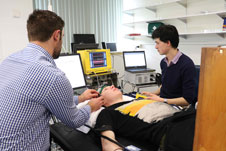
New research from the University of Otago, Wellington, has identified new risk factors for secondary stroke in patients who have suffered a 'mini-stroke' or transient ischaemic attack (TIA). The findings open the way for developing potential new treatments to prevent subsequent full strokes, the researchers believe.
The investigation focused on TIA patients based in Wellington. Researchers from the University of Otago collaborated with Capital & Coast DHB clinicians and Massey University to investigate the blood pressure and blood flow characteristics in patients who had just suffered a TIA.
Published in the US journal Physiological Reports, the study showed that after TIAs, patients have greater blood pressure variability which may increase their risk of stroke.
“We investigated blood pressure and cerebral blood flow characteristics in these patients to find potential new treatment targets,” says Dr Shieak Tzeng from the University of Otago, Wellington.
Transient ischaemic attacks are a common medical emergency. Sometimes foreshadowing a full stroke, they offer a crucial opportunity to intervene. Secondary prevention of acute stroke is an important strategy against the rising human and economic cost of stroke.
“One of our goals is to identify patients at high risk of stroke and lower the prospect of a full event occurring,” says Dr Tzeng.
“We found that patients who have suffered a TIA have more variable blood pressure one to two weeks after presentation. If we can assess and attenuate blood pressure variability in that phase, we may be able to prevent progression to stroke. We need to do further longitudinal studies to investigate this,” he says.
Blood pressure variability can be monitored non-invasively and therefore could be targeted as a means to reduce the incidence of poor neurological outcomes following TIAs. In collaboration with Dr Jeremy Lanford of Capital & Coast DHB, the research team are investigating nitrate supplementation as a possible means of lowering blood pressure variability in TIA patients.
“We are also looking for healthy volunteers to participate in a follow-up study to investigate brain blood flow control in depth,” Dr Tzeng added. For futher information or to volunteer in future studies, please email ctp.wellington@otago.ac.nz
For further information contact:
Dr Shieak Tzeng
Centre for Translational Physiology,
Department of Surgery and Anaesthesia
University of Otago, Wellington
Tel: 04 806 1504
Email: ctp.wellington@otago.ac.nz
Web: www.otago.ac.nz/uow-physiology/index.html
A list of Otago experts available for media comment is available elsewhere on this website.
Electronic addresses (including email accounts, instant messaging services, or telephone accounts) published on this page are for the sole purpose of contact with the individuals concerned, in their capacity as officers, employees or students of the University of Otago, or their respective organisation. Publication of any such electronic address is not to be taken as consent to receive unsolicited commercial electronic messages by the address holder.
